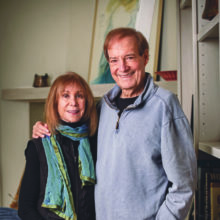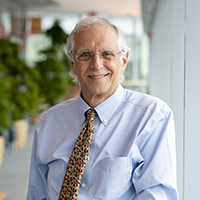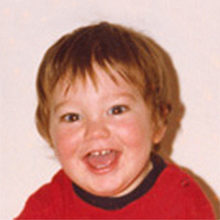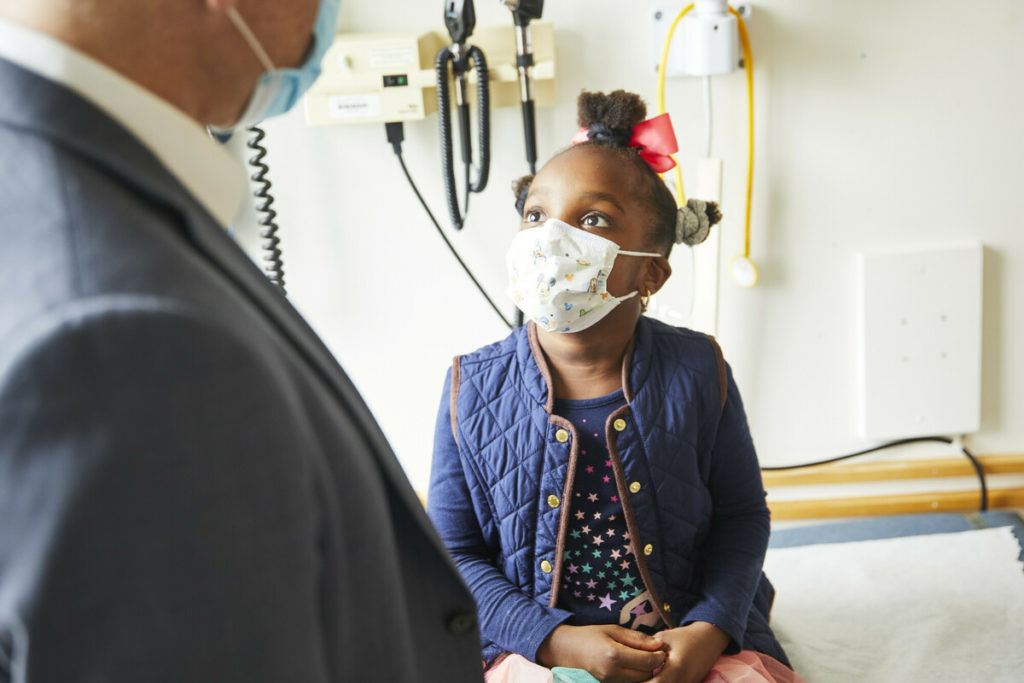The request came to Bert Davidson from a nurse in Massachusetts General Hospital’s Pediatric Hematology Oncology Clinic: A 16-year-old leukemia patient named Joe was battling a recurrence. Against the odds, doctors had gotten the boy’s cancer into remission, but his long-term outlook remained grim. Still, the care team thought Joe and his father needed a way to celebrate the good news. A devoted fan of the Boston Celtics, Joe had never been to a game. “Can you help?” the nurse asked Bert.
It was the afternoon of November 24, 1982, the day before Thanksgiving, and the 10-2 Celtics were the hottest ticket in town. It was three hours until tipoff. Chances were slim, at best.
“But I had to try,” says Bert. “I never wanted two tickets to anything more than I wanted those two at that moment.”
Less than a year earlier, Bert and his wife Toby had lost their 2-year-old son, Charley, to acute lymphoblastic leukemia (ALL) — the same disease Joe was battling. In the months following Charley’s death, the couple channeled their grief into action. They knew the steep odds facing children with ALL, and they knew the terrible toll that treatment had on families. With that in mind, they established the Charley Davidson Children’s Cancer Fund to support research, improve outcomes and provide comfort for other kids undergoing treatment at Mass General for Children (MGfC), and their parents.

That night, Bert was making one of his regular deliveries of toys and VHS tapes to the MGfC clinic when nurse Monica Corrigan asked him about the tickets. “Can I use your phone?” he asked. A short while later, Bert had the tickets, thanks to a friend.
In the hallway, Monica introduced Bert to Joe’s father. Though he’d never see him again, Bert still remembers the other man’s face — his tired eyes and stubble. “It was the look you get sleeping on floors, watching your child fight for their life,” he says.
Joe’s father thanked Bert for the tickets. As they shook hands, Bert recalls him saying, “(My son) is a long shot. He may not see Christmas, but we’ll always have tonight.” That night, Joe and his dad watched the Celtics defeat the Portland Trailblazers from seats of honor — on the Celtics bench.
The Most Common Childhood Cancer
ALL — which accounts for one in every three cancer diagnoses in children and teens — occurs when a mutation in the bone marrow leads to the overproduction of lymphoblasts (a type of immature white blood cell). In time, those lymphoblasts crowd out healthy blood cells and platelets, leaving the patient vulnerable to bacterial infection and bleeding. Until the 1950s, ALL was uniformly fatal.
The first ray of hope came in 1947, when pathologist Sidney Farber demonstrated the first successful use of chemotherapy to force ALL into remission. But the cancer almost always returned. By 1980, thanks to pharmaceutical advances and a better understanding of the disease, the five-year survival rate for children with ALL had risen to 49% — but treatment was arduous.

“It was a long haul for children in those days,” says Howard Weinstein, MD, unit chief of Pediatric Hematology/Oncology at MGfC. The disease was typically confirmed with a painful bone marrow test. From there, patients would often spend months in the hospital receiving chemotherapy, blood transfusions and antibiotics. Remission meant years of regular “maintenance” chemotherapy to keep the disease at bay, and recurrence was a word no parent wanted to hear.
Today, however, 98% of children with ALL go into remission within weeks of starting treatment, and most are cured completely. Recent progress in the use of immunotherapy — at Mass General and elsewhere — has provided patients with even more treatment options.
Leukemia patients seeking treatment at MGfC now have access to state-of-the-art diagnosis and care, including clinical trials. In parallel, researchers and clinicians at Mass General are working to find new therapeutic agents to increase cure rates; minimize short- and long-term complications from therapy; and ultimately identify, predict and target unique genetic subgroups of the disease. The funds raised by the Charley Davidson Children’s Cancer Fund have been critical in this progress.
“The transformation of ALL care has been very exciting,” Dr. Weinstein says. “And the future looks brighter yet.”
37 Years Later — The Call
Bert cannot say for sure why he answered the phone that day in March 2019. He didn’t recognize the number, and there was no caller ID. He just had a feeling.
“Bert, I don’t know if you remember me …” the voice began. “It’s Joe.”
Bert had often thought of Joe and his father over the years. Following the Celtics game, Joe’s family made annual contributions to the Charley Davidson’s Children’s Cancer Fund — but when the checks stopped arriving a few years later, Bert feared the worst. Against the odds, though, the boy had survived. Bert was deeply moved.

Joe — now in his early 50s, with a family of his own — was calling to let Bert know that his father, who was nearing the end of his life, wanted to include the Charley Davidson Fund in his estate.
“We never forgot it,” Joe told Bert about that night, 37 years before. “It was a turning point from the darkest of times for both of us.”
What Joe didn’t mention, and what Bert would find out months later, was that his father was making a seven-figure contribution.
“That kind of philanthropy is golden for us,” Dr. Weinstein says. “The National Institutes of Health have been funding cancer research and leukemia research for a long time — but their support falls far below what is needed to move the field. This kind of a transformative gift will enable us to make an impact for our patients and for children all over the world.”
“We are so moved by this gift, and so proud that our investment in Mass General has helped make a difference for children in need,” say Bert and Toby.
The Charley Davidson Children’s Cancer Fund (CDCCF)
The Charley Davidson Children’s Cancer Fund is one of the longest running fundraising efforts in Mass General history. Since its founding in 1982, the CDCCF has raised more than $4 million to support the Pediatric Hematology Oncology Clinic at MGfC. Every cent raised by the CDCCF goes directly to support young patients, their families and the MGfC Cancer Center in its ongoing mission to eradicate pediatric cancer.
To find out how you can help in the fight against pediatric cancer, contact us.


